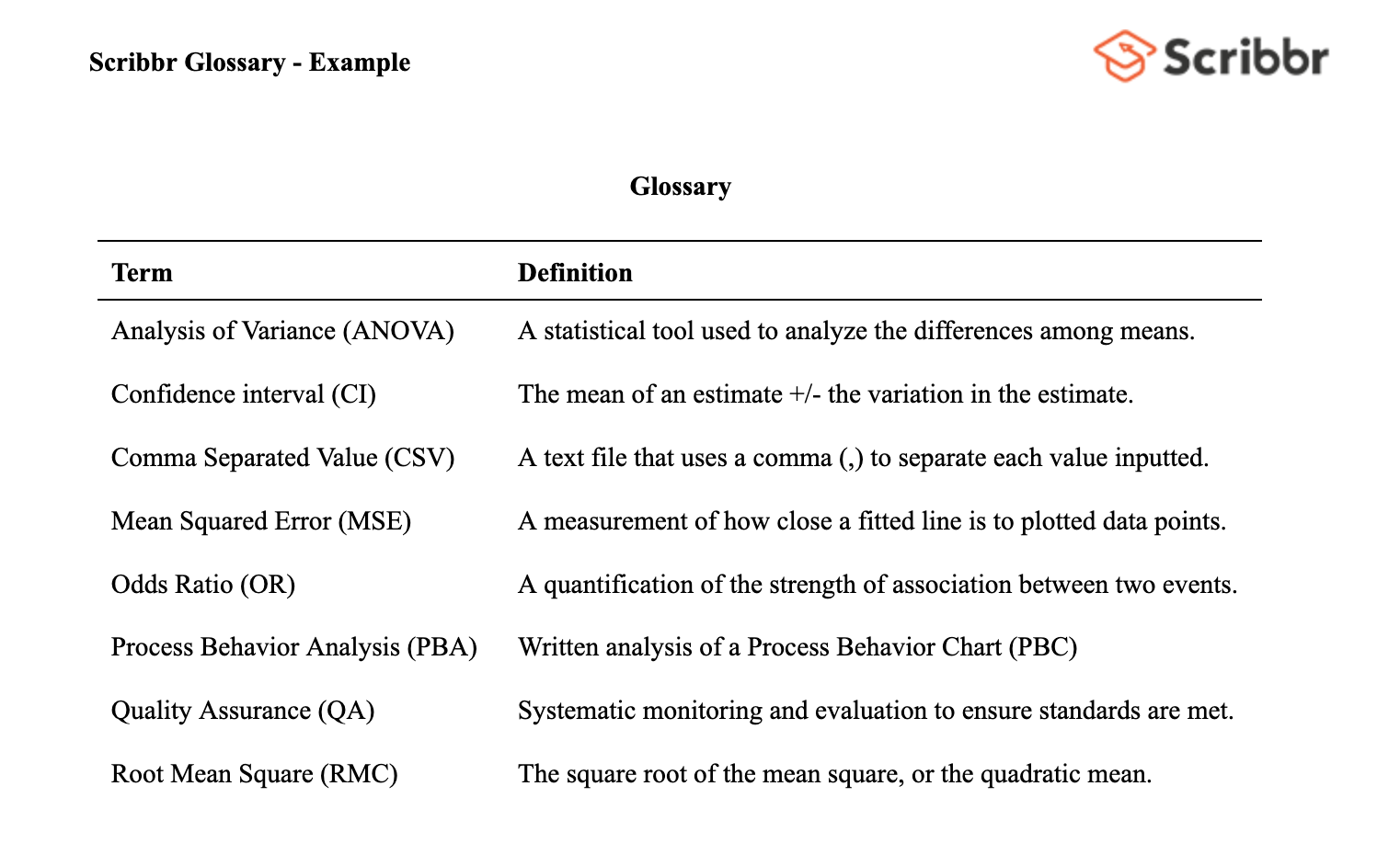What Is a Glossary? | Definition, Templates, & Examples
A glossary is a collection of words pertaining to a specific topic. In your thesis or dissertation, it’s a list of all terms you used that may not immediately be obvious to your reader.
Your glossary only needs to include terms that your reader may not be familiar with, and it’s intended to enhance their understanding of your work. Glossaries are not mandatory, but if you use a lot of technical or field-specific terms, it may improve readability to add one.
If you do choose to include a glossary, it should go at the beginning of your document, just after the table of contents and (if applicable) list of tables and figures or list of abbreviations. It’s helpful to place your glossary at the beginning, so your readers can familiarise themselves with key terms prior to reading your work. Remember that glossaries are always in alphabetical order.
To help you get started, download our glossary template in the format of your choice below.
Download Word doc Download Google doc
Example of a glossary
Citing sources for your glossary
Glossaries and definitions often fall into the category of common knowledge, meaning that they don’t necessarily have to be cited.
However, it’s always better to be safe than sorry when it comes to citing your sources, in order to avoid accidental plagiarism.
If you’d prefer to cite just in case, you can follow guidance for citing dictionary entries in MLA or APA Style for citations in your glossary. Remember that direct quotes should always be accompanied by a citation.
Additional lists to include in your dissertation
In addition to the glossary, you can also include a list of tables and figures and a list of abbreviations in your thesis or dissertation if you choose.
Include your lists in the following order:
Frequently asked questions about glossaries
- What is the definition of a glossary?
-
A glossary is a collection of words pertaining to a specific topic. In your thesis or dissertation, it’s a list of all terms you used that may not immediately be obvious to your reader. Your glossary only needs to include terms that your reader may not be familiar with, and is intended to enhance their understanding of your work.
- Are citations necessary in a glossary?
-
Definitional terms often fall into the category of common knowledge, meaning that they don’t necessarily have to be cited. This guidance can apply to your thesis or dissertation glossary as well.
However, if you’d prefer to cite your sources, you can follow guidance for citing dictionary entries in MLA or APA style for your glossary.
- What’s the difference between a glossary and an index?
-
A glossary is a collection of words pertaining to a specific topic. In your thesis or dissertation, it’s a list of all terms you used that may not immediately be obvious to your reader. In contrast, an index is a list of the contents of your work organised by page number.
- Is a glossary mandatory?
-
Glossaries are not mandatory, but if you use a lot of technical or field-specific terms, it may improve readability to add one to your thesis or dissertation. Your educational institution may also require them, so be sure to check their specific guidelines.
- What is the difference between a glossary and a dictionary?
-
A glossary is a collection of words pertaining to a specific topic. In your thesis or dissertation, it’s a list of all terms you used that may not immediately be obvious to your reader. In contrast, dictionaries are more general collections of words.
Cite this Scribbr article
If you want to cite this source, you can copy and paste the citation or click the ‘Cite this Scribbr article’ button to automatically add the citation to our free Reference Generator.
George, T. (2022, October 25). What Is a Glossary? | Definition, Templates, & Examples. Scribbr. Retrieved 9 December 2024, from https://www.scribbr.co.uk/thesis-dissertation/what-is-a-glossary/



